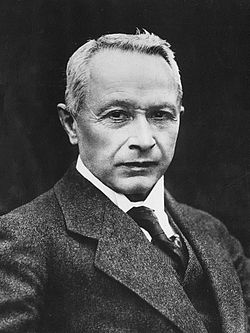Hugo Junkers
| Hugo Junkers | |
|---|---|

Hugo Junkers in 1920
|
|
| Born |
3 February 1859 Rheydt, Rhine Province, Kingdom of Prussia |
| Died | 3 February 1935 (aged 76) Gauting, Bavaria |
| Resting place | Munich Waldfriedhof |
| Nationality | German |
| Education |
Royal Polytechnic University in Charlottenburg Royal Technical University in Aachen |
| Occupation | engineer |
Hugo Junkers (3 February 1859 – 3 February 1935) was a German engineer and aircraft designer. As such, he is generally credited with pioneering the design of all-metal airplanes and flying wings. As founder of the Junkers Flugzeug- und Motorenwerke AG, he was one of the mainstays of the German aircraft industry in the years between World War I and World War II. In particular, his multi-engined all-metal passenger- and freight planes helped establish airlines in Germany, as well as all over the world. Although his name is also linked to some of the most successful German warplanes of the Second World War, Hugo Junkers himself had nothing to do with their development. He was forced out of his own company by the Nazi government in 1934 and died on his 76th birthday, in 1935.
As well as aircraft, Junkers also built both diesel and petrol engines and held various thermodynamic and metallurgical patents. He was also one of the main sponsors of the Bauhaus movement and facilitated the move of the Bauhaus from Weimar to Dessau (where his factory was situated) in 1925.
Amongst the highlights of his career were the Junkers J 1 of 1915, the world's first practical all-metal aircraft, incorporating a cantilever wing design with virtually no external bracing, the Junkers F 13 of 1919 (the world's first all-metal passenger aircraft), the Junkers W 33 (which made the first successful heavier-than-air east-to-west crossing of the Atlantic Ocean), the Junkers G 38 "flying wing", and the Junkers Ju 52, affectionately nicknamed "Tante Ju", one of the most famous airliners of the 1930s.
Junkers was born in Rheydt in the Prussian Rhine Province, the son of a well-off industrialist. After taking his Abitur exams in 1878, he attended the Royal Polytechnic University in Charlottenburg and the Royal Technical University in Aachen, where he completed his engineering studies in 1883.
...
Wikipedia
